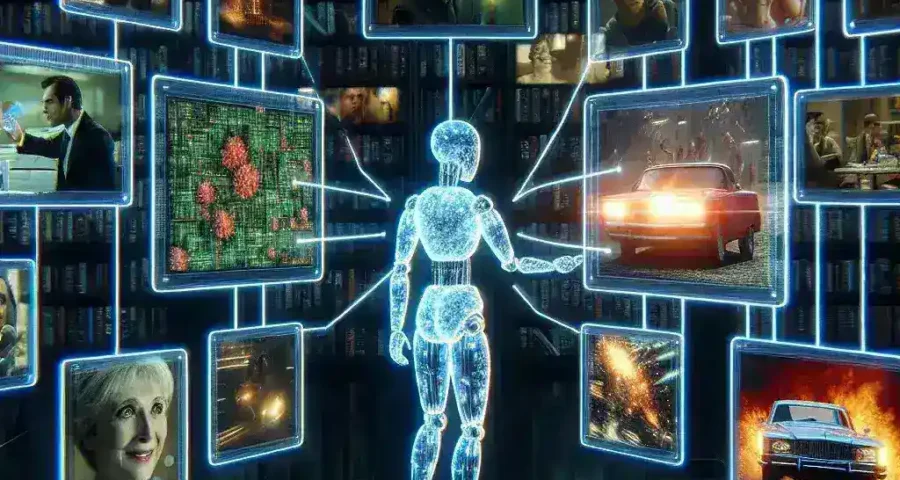Introduction
As the digital entertainment landscape continues to evolve, streaming giants like Netflix are constantly seeking innovative ways to enhance user experience. Recently, Netflix has announced that it is piloting an AI-powered scene selection personalization feature on its U.S. platforms. This groundbreaking initiative aims to tailor the viewing experience to individual preferences, allowing users to select specific scenes that resonate with their tastes. In this article, we will delve into the implications of this development, explore its potential benefits, and analyze how it might reshape the landscape of streaming services.
The Evolution of Streaming Services
Since its inception in 1997, Netflix has revolutionized how we consume content. Transitioning from a DVD rental service to a full-fledged streaming platform, Netflix has continuously adapted to changing viewer behaviors and technological advancements. With over 230 million subscribers globally, the company has set the standard for on-demand content consumption. As competition intensifies among streaming platforms, Netflix recognizes the importance of personalization in retaining user engagement.
Understanding AI-Powered Personalization
Artificial Intelligence (AI) refers to the capability of machines to simulate human intelligence, enabling them to perform tasks such as learning, reasoning, and problem-solving. In the context of streaming services, AI algorithms can analyze vast amounts of data about user behavior, preferences, and viewing habits. This analysis enables platforms to deliver personalized content recommendations, enhancing user satisfaction.
What is Scene Selection Personalization?
Scene selection personalization is a novel concept that allows users to choose specific scenes from a movie or series based on their preferences. This feature utilizes AI to analyze a user’s viewing history, indicating which types of scenes resonate with them the most. For instance, if a user frequently engages with action-packed sequences or comedic moments, the AI will prioritize these elements in suggesting scenes.
How Does It Work?
The scene selection personalization feature operates through a multi-step process:
- Data Collection: The AI collects data on user interactions, such as scenes watched, rewinded, or fast-forwarded.
- Behavior Analysis: Advanced algorithms analyze viewing patterns to identify preferences.
- Scene Tagging: Content creators tag scenes with metadata that indicates characteristics like genre, action level, or emotional tone.
- Personalized Recommendations: The AI generates tailored suggestions, allowing users to jump directly to scenes they are likely to enjoy.
Benefits of AI-Powered Scene Selection
Netflix’s implementation of AI-powered scene selection personalization can yield numerous benefits:
1. Enhanced User Experience
By offering personalized scene recommendations, Netflix can significantly enhance the user experience. Viewers can quickly access their favorite moments without scrolling through entire films or episodes, making the platform more user-friendly.
2. Increased Viewer Retention
Personalization is a crucial factor in viewer retention. By catering to individual tastes, Netflix can keep subscribers engaged and encourage them to explore more content, reducing the chances of cancellations.
3. Discoverability of Content
AI-powered recommendations can pave the way for users to discover new genres, directors, or series that align with their interests. By presenting tailored suggestions, Netflix can introduce viewers to content they may not have considered otherwise.
4. Improved Engagement
With the ability to select specific scenes, users may spend more time on the platform, leading to higher engagement rates. More engagement can translate into increased ad revenue for platforms that integrate advertising.
Potential Concerns and Drawbacks
While the benefits of scene selection personalization are promising, there are concerns to consider:
1. Privacy Issues
The collection of extensive data on user behavior raises privacy concerns. Users may feel uncomfortable with the extent of data being collected and how it is utilized.
2. Content Fragmentation
Some critics argue that scene selection may lead to content fragmentation, where viewers only engage with select parts of a film or series. This could diminish the overall narrative experience intended by creators.
3. Dependency on Algorithms
Relying too heavily on AI algorithms could result in a narrowed viewing experience. If users are only exposed to a limited range of content based on algorithmic predictions, it could stifle creativity and exploration.
Historical Context: Netflix and Personalization
Netflix has long been a pioneer in personalization, leveraging algorithms to recommend shows and movies based on viewer preferences. The introduction of scene selection personalization represents a natural evolution of this approach. The platform’s original recommendation system utilized a simple thumbs-up and thumbs-down system, which has since transformed into a sophisticated AI-driven model capable of complex analyses.
Future Predictions
As AI technology continues to advance, the future of scene selection personalization looks promising. We can expect more nuanced recommendations that incorporate emotional and contextual factors, further enhancing personalization. Additionally, as user expectations grow, streaming services may need to adopt similar techniques to stay competitive.
Real-World Examples and Cultural Relevance
Similar personalization techniques have been successful in other industries. For instance, Spotify uses AI to curate personalized playlists based on listening habits, significantly enhancing user satisfaction. In the realm of e-commerce, platforms like Amazon employ AI to recommend products tailored to individual shopping behaviors, driving sales and enhancing user loyalty.
Expert Insights
Industry experts highlight the significance of personalization in the future of streaming. According to Dr. Emily Chen, a leading AI researcher, “Personalization is no longer just a luxury; it’s a necessity. As users become accustomed to tailored experiences, platforms must evolve to meet these expectations.”
Conclusion
Netflix’s piloting of AI-powered scene selection personalization in U.S. platforms marks a significant milestone in the evolution of streaming services. By leveraging AI technology, Netflix aims to redefine how users interact with content, enhancing personalization, engagement, and discoverability. While there are valid concerns surrounding privacy and content fragmentation, the potential benefits far outweigh the drawbacks. As we look to the future, it will be fascinating to see how this feature evolves and influences the broader streaming landscape. Whether this will set a new standard for personalization across platforms remains to be seen, but one thing is clear: the future of streaming is undoubtedly personal.


Leave a Reply